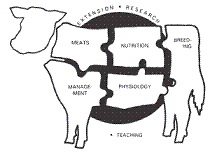Animal Science, Department of

Nebraska Beef Cattle Reports
Date of this Version
2023
Citation
2023 Nebraska Beef Cattle Report
UNL Beef, Institute of Agriculture and Natural Resources, University of Nebraska-Lincoln
Abstract
A simulation study investigated and provided potential solutions to practical issues that could arise from including gene-edited sires in routine genetic evaluations. Gene-editing is a technique for adding, deleting, or replacing nucleotides in the genome. Editing nucleotides controlling important socioeconomic traits (e.g., growth, carcass, disease susceptibility) is expected to improve rates of genetic gain. However, targeted alterations of the genome can affect the relationship among individuals and, consequently, introduce bias in Expected Progeny Differences. The current study illustrated that, indeed, Expected Progeny Differences for the progeny of edited sires were underestimated. Consequently, these animals would be less likely to be selected as parents for subsequent generations. Therefore, if edited sires are introduced into genetic evaluations, the statistical models used in the evaluation need to appropriately accommodate the changes among animals that the targeted gene edits create, and adjusting the kinship among animals is one way to do this. Without accounting for these targeted changes Expected Progeny Differences will be biased, and selection decisions could be made incorrectly.
Included in
Large or Food Animal and Equine Medicine Commons, Meat Science Commons, Veterinary Preventive Medicine, Epidemiology, and Public Health Commons

